Top best eCommerce analytics tools (according to marketers and business owners)

If you manage an eCommerce website, you’ve had to analyze metrics to validate or optimize specific marketing strategies. But sometimes, getting lost in the data is easy, so keeping your eCommerce analysis focused on a few key metrics will help ensure you stay on track.
Introducing eCommerce data analytics tools.
Ecommerce analytics solutions can provide real-time powerful, data-driven, actionable insights that help you measure your business’s progress. In this guide, we asked partners, collaborators, marketers, and business owners to help us create an exhaustive list of the top eCommerce analytics tool they use.
Let’s dive in.
What are eCommerce analytics tools
Ecommerce site analytics tools are used to analyze user behavior on an online store. They can improve customer journeys or conversion rates by checking heat maps, scroll maps, recordings, data, and more. Usually, these tools will help track KPIs like cart abandonment, bounce rate, conversion rate, average order value, lifetime value, and all other metrics that help marketers provide a better customer experience.
Why they’re essential for business owners and marketers
By using a tool to gather eCommerce data, businesses can better understand changes in customer acquisition, behaviors, user experience, and much more. In return, this can help businesses to take data-driven action and changes in eCommerce strategies. Often, eCommerce tools provide advanced analytics or even gather data from multiple sources and create a more concise eCommerce report with the most important KPIs.
Top eCommerce analytics tools
1. Google Analytics
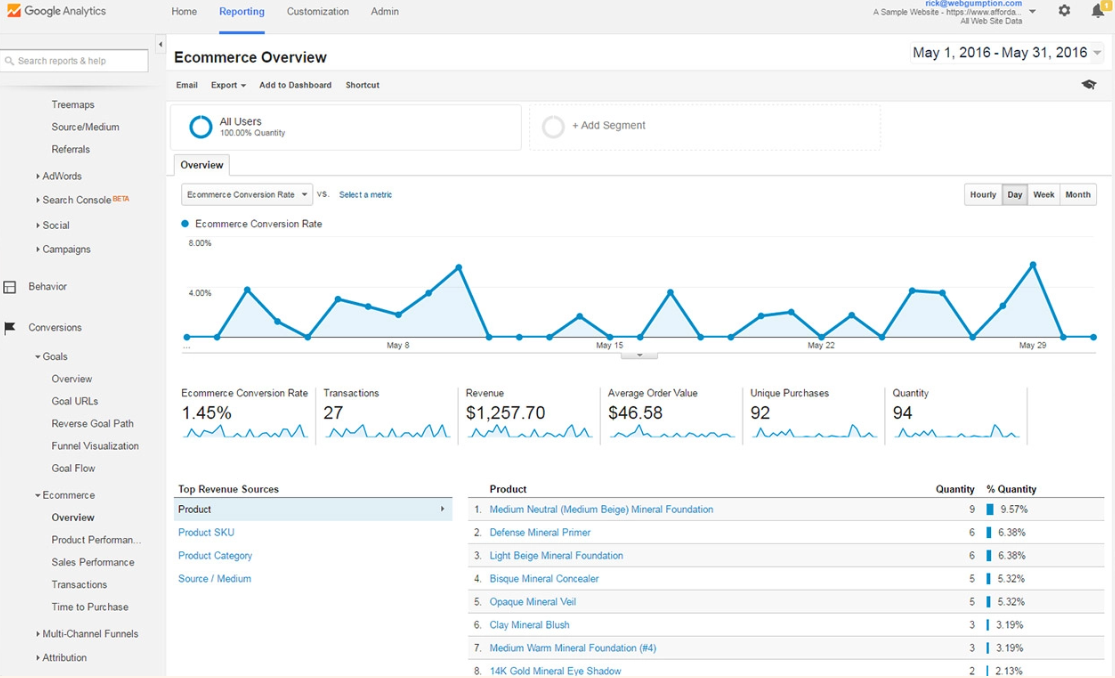
Source: https://learndigitaladvertising.com/ecommerce-tracking/
Not surprisingly, Google Analytics is the most recommended tool, showing its power. Google Analytics is a web analytics service that provides statistics on campaigns, and audiences, usually used for SEO, eCommerce, and digital marketing purposes. In addition, it’s free, giving it an advantage over alternatives while still providing eCommerce marketing analytics, audience, and customer data.
Kristi Smith, Editor-in-Chief & Operational Manager of Honest Brand Reviews, says, “We’ve tried a few different options, but Google Analytics is our favorite now. It is free and relatively easy to set up, and you can mine a lot of data from it. For instance, you can use this tool to see which marketing channels drive the most traffic and sales. Also, the most visited pages on your website and how your paid marketing campaigns perform. All this information has helped us focus our marketing efforts and better allocate our resources.”
Sergei Elkin, Chief Business development officer of Taplink added: “We use Google Analytics to study our stores' overall performance. We use it to analyze common drop-off points, discover the sources of the store's traffic, and find out the difference in the bounce rate between pages. Also, knowing what devices our customers use the most helps us plan our content and marketing strategies.”
“Utilising a tool like Google Analytics is essential to track your eCommerce store and website performance. It’s free, and you can analyze metrics such as conversion rate, converting products, top-performing pages, bounce rate, and more. We also use Page Analytics by Google, a free Chrome extension connected to the Google Analytics account. Visualizing a web page is easy – you must log in and navigate to the desired page to see the data.” Paula Glynn, Director of Search Marketing & Digital Strategy at Pixelstorm.
Angus Carbarns, the founder of We Are Engines, talks about the new GA4 functionalities and says, “On the quantitative side of things, GA4's revamped eCommerce functionality has expanded what we can learn about clients' product and category performance. With an expanded set of customizable categories available in the data layer, there's much more we can learn from our data, and the insights we're generating are much deeper than before.”
2. Kissmetrics
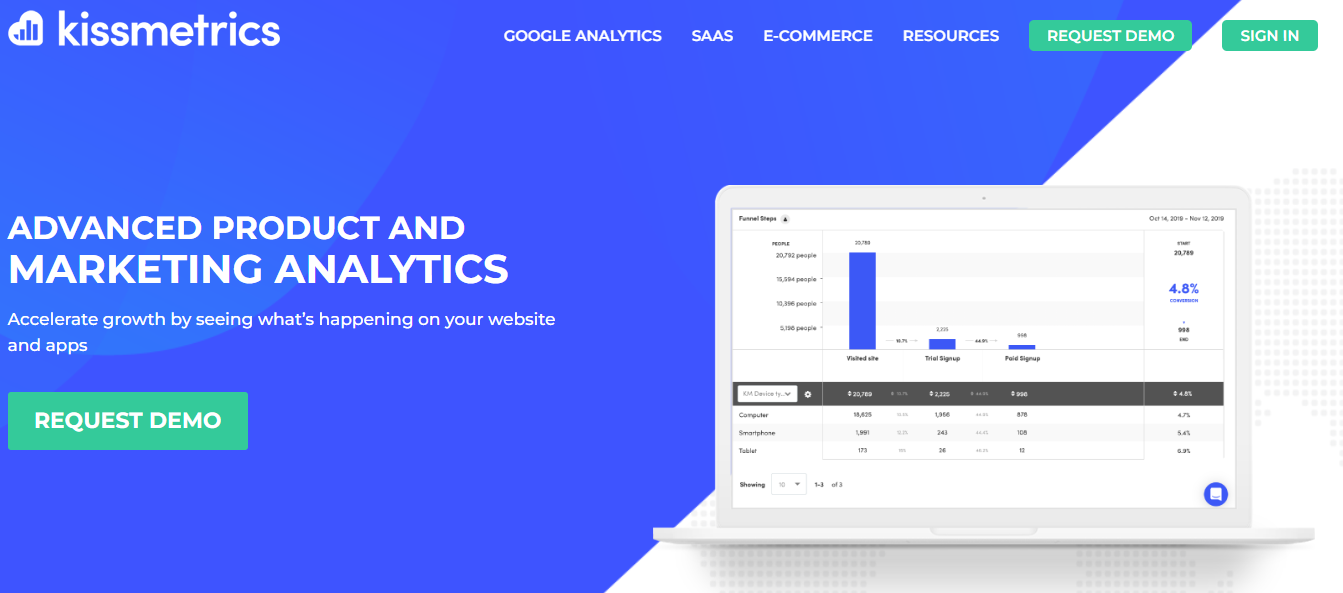
Kissmetrics is a powerful Saas and eCommerce tool that lets users optimize the shopping cart checkout funnel, increase purchases, and report on all essential eCommerce data.
Werner Jorgensen, Sales and Marketing Manager at Heatxperts, told us, “KISSmetricsis an eCommerce analytics tool with the slogan that will help you "get, keep, and grow more consumers." It offers beneficial information. It's an analytics product that enables you to identify, understand, and improve the metrics that drive your online business. Website owners can improve customer retention rates by doing these things. Another great thing about the KISSmetrics tool is its aesthetic. They will help you make better decisions on the layout and marketing of your online store. It has different fee structures from silver to platinum, or you can make your custom fee plan.”
“KISSmetrics is another customer intelligence eCommerce platform that helps businesses improve customer acquisition and retention rates. It provides insights into customer behavior and engagement, so businesses can identify areas for improvement. Additionally, it offers tools for A/B testing and email marketing.” Brenton Thomas, Founder & CEO at Twibi.
3. Semrush

For Sergei Elkin, Chief Business Development Officer of Taplink, Semrush changed their approach to measuring the performance of our stores marketing. “Because of the niches of our stores, Google Ads were always the bigger part of our budget. But after discovering Semrush, we change our strategy completely. Now we focus on SEO. Yes, SEO is a long-term investment, but with the Semrush toolbox, it's a no-brainer. On top of that, Semrush's got great tools for marketing.”
4. Hotjar
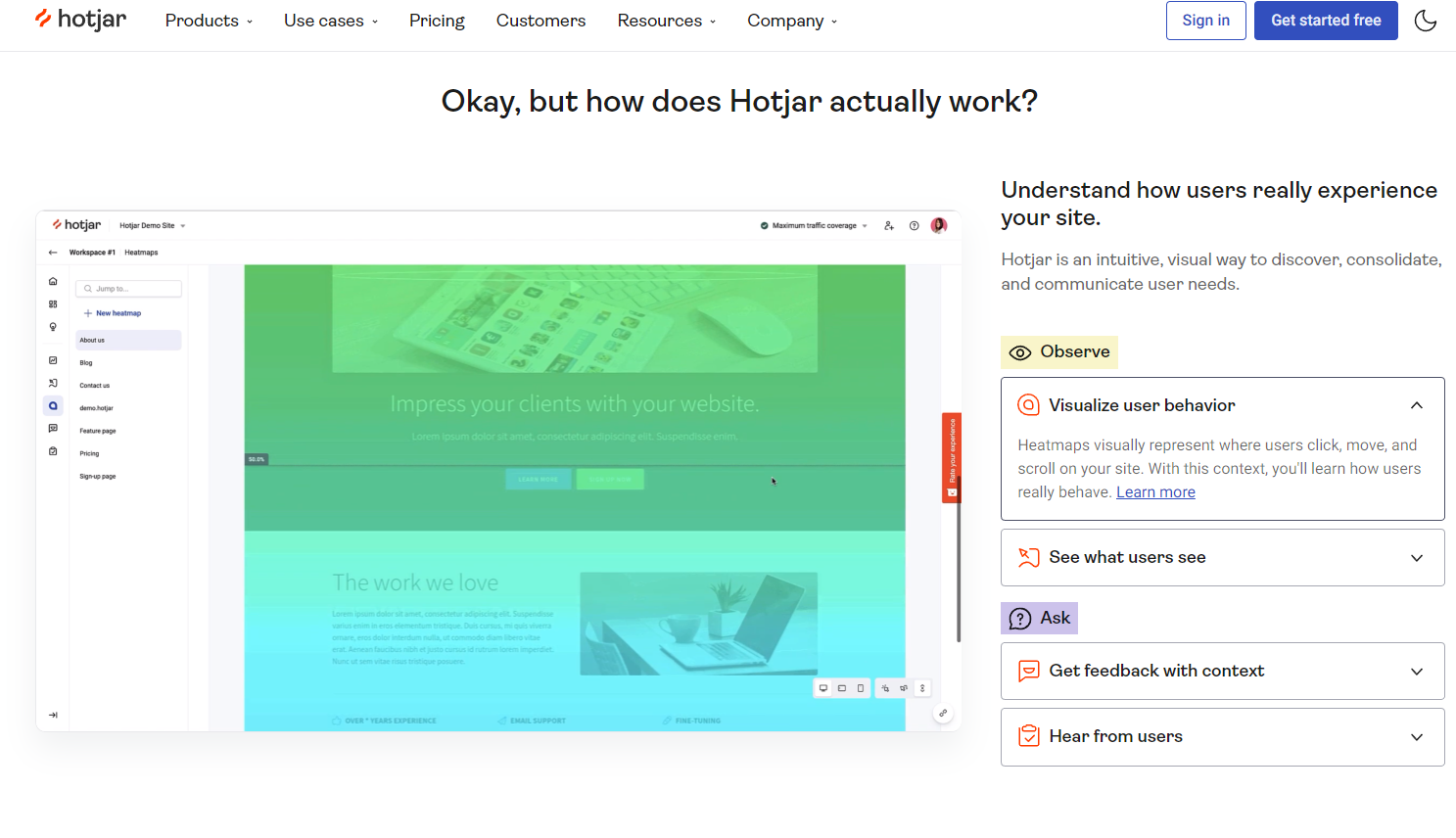
Hotjar is a visual tool that helps you see how your users interact with your site using heatmaps. You can also create real-time recordings of users to help improve your conversion rates.
“Hotjar is the tool we use to analyze user interaction. The tool allows us to identify all the unpopular spots in our store. Identifying such "cold" pages makes it easier for us to plan future updates. It is also great for collecting feedback from our customers. It even lets us record user behavior in real-time.” Sergei Elkin, Chief Business Development Officer of Taplink.
“In terms of gaining qualitative insights, Hotjar is a tool we consistently use to better understand how users interact with a store's key features and functionality. Seeing how users interact with our clients' key landing pages, filters and navigation is huge for building on hypotheses for improvement and testing and for building shared understanding with product teams.” Angus Carbarns is the founder of We Are Engines - a digital strategy, UX research, and CRO consultancy based in the UK. With an academic background in psychology and sociology, Angus brings the rigor of social science to the practice of CRO and user research for a wide range of eCommerce brands.
5. Shopify Analytics
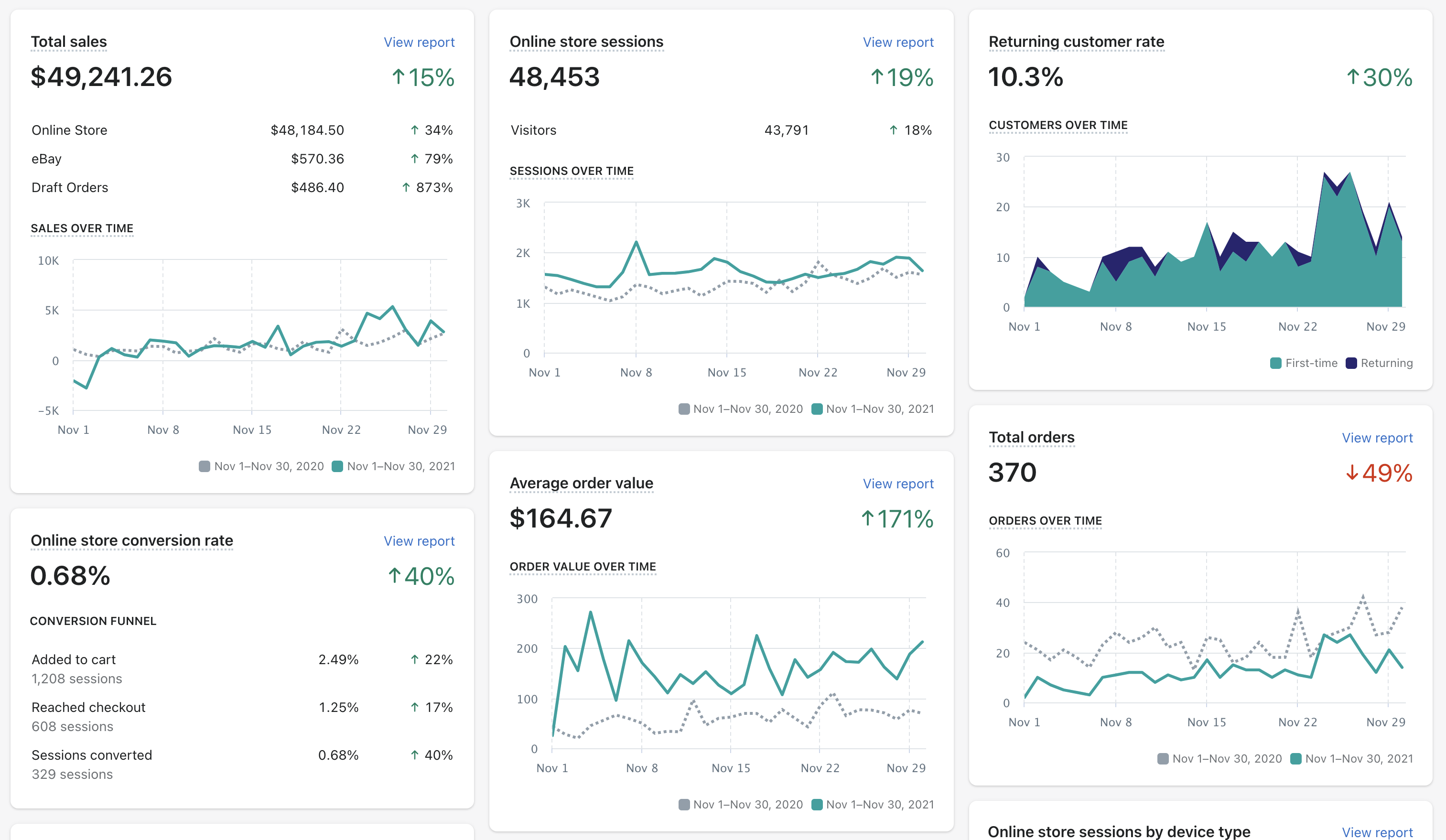
For Shopify users, the platform itself provides insightful data about a sales funnel and audience behaviors.
“Shopify's built-in metrics should be sufficient if you're starting and don't anticipate a high sales volume. You'll have access to fundamental metrics like sales and stock levels. Shopify, in my opinion, goes above and beyond the call of duty by providing in-built reporting tools that reveal which products are selling the most and where your visitors are coming from, both of which are invaluable insights into the success of your online store. In addition, Shopify's in-house analytics are free of charge, exactly like Google Analytics,” explains Tia Campbell, Director of Marketing at Practice Reasoning Tests.
6. Optimizely

This increasingly popular eCommerce analytics software focuses on A/B testing and optimization to create a more authentic shopping experience.
Tim Parker, Director of Marketing at Syntax talked about Optimizely: “Do you want to improve your customer's buying experience by making it more unique? The tools available in Optimizely make for a solid foundation. This analytics platform for online stores employs A/B testing and optimization to provide a more genuine buying experience. You may also try out different chatbots and checkout processes to see if they help reduce cart abandonment”.
7. Woopra
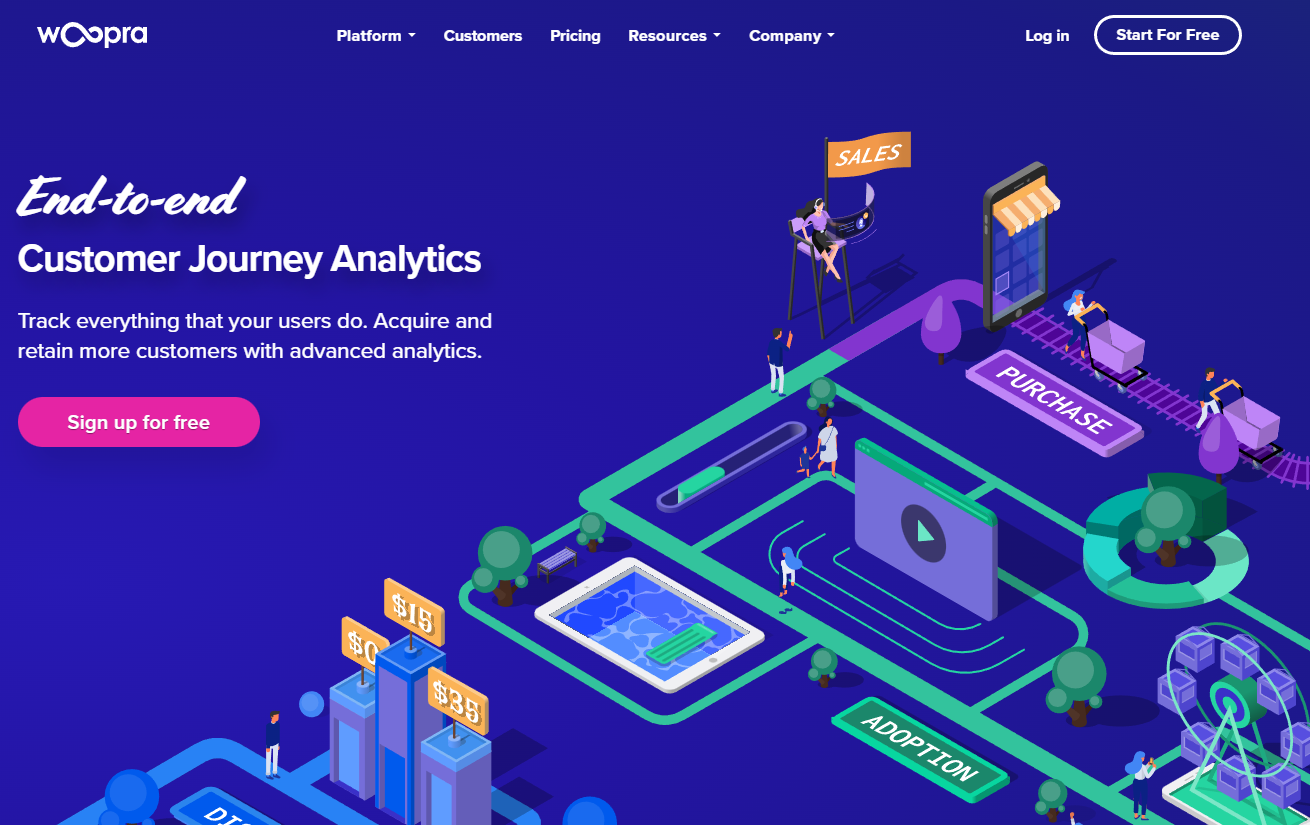
Woopra’s primary focus is to help its customers lower cart abandonment rates by identifying drop-off points throughout the sales process.
Stacey Kane, Business Development Lead at EasyMerchant, “A key component of our eCommerce strategy is keeping track of our client's journey. This is what Woopra, a popular productivity tool, helps us do. For example, we can tell when a customer completes a purchase or decides to leave our website. This gives us important feedback, which we can then use to improve our customers' eCommerce experience in the hope that we inspire them to complete their purchases and make repeat transactions in the future.”
8. Dashthis
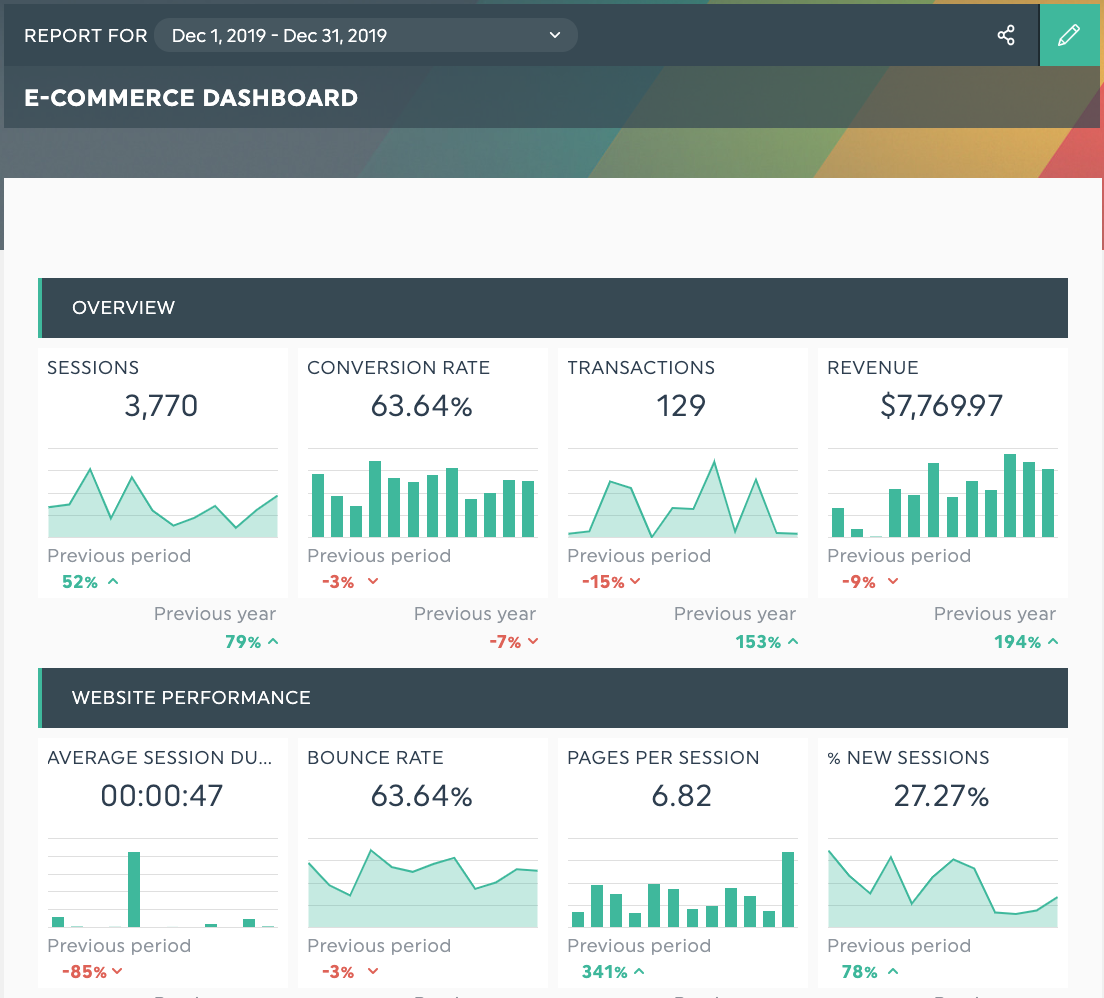
Grab this template with your data!
Your online business probably uses various marketing platforms, from analytics to social media, SEO and email campaign tools… and everything in between! With DashThis, you can connect your eCommerce dashboard to over 30 integrations, including Klaviyo, Google Analytics, Ahrefs, MailChimp, Google AdWords, Facebook Ads, Moz, and Instagram.
Dashthis’s report templates are user-friendly, seamless, and can be easily shared with your team or clients. Here is what our client,
Reef Digital Agency, has recently said about us, "We've played around with countless reporting tools over the years, but none of them come close to Dashthis. The integration and customization of reports and their outstanding client support are unrivaled!”
We’re always looking for eCommerce analytics tools alternatives. Do you want to contribute to this article? Drop us a line to let us know!
Cheers, and happy reporting!
Try our eCommerce report template!
Read More
Don’t miss out!
Automate your reports!
Bring all your marketing data into one automated report.
Try dashthis for free

